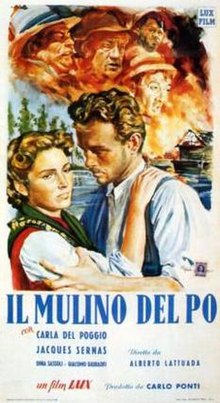
Mario Alberto Lattuada was an Italian film director.

Maria Luisa Attanasio, known by her stage name Carla Del Poggio, was an Italian cinema, theatre, and television actress. A native of Naples, she was the wife of Italian director Alberto Lattuada for 60 years, from 2 April 1945 until his death 3 July 2005. She died at the age of 84 from undisclosed causes.

Variety Lights is a 1951 Italian romantic drama film produced, directed and written by Federico Fellini and Alberto Lattuada and starring Peppino De Filippo, Carla Del Poggio, and Giulietta Masina. The film is about a beautiful and ambitious young woman who joins a traveling troupe of third-rate vaudevillians and inadvertently causes jealousy and emotional crises. A collaboration with Alberto Lattuada in production, direction, and writing, Variety Lights launched Fellini's directorial career. Prior to this film, Fellini worked primarily as a screenwriter, most notably working on Roberto Rossellini’s Rome, Open City.

Riccardo Bacchelli was an Italian writer. In 1927 he was one of the founders of the review La Ronda and Bagutta Prize for literature. He was nominated for the Nobel Prize in Literature eight times.

Giovanna Ralli,, is an Italian stage, film and television actress.

The Bandit is a 1946 Italian drama crime film directed by Alberto Lattuada and starring Anna Magnani, Amedeo Nazzari and Carla Del Poggio. It was shot on location in Turin. Nazzari won the Nastro d'Argento as Best Actor for his performance. The film was entered into the 1946 Cannes Film Festival.

Giulio Calì was an Italian film actor. He appeared in more than 60 films between 1927 and 1966.

Carla Gravina is an Italian actress and politician. She received a Cannes Film Festival Award for Best Actress for her role in La Terrazza (1980). Her other notable roles were in Love and Chatter (1957), Esterina (1959), and The Long Silence (1993). Gravina used to be a member of the Chamber of Deputies.
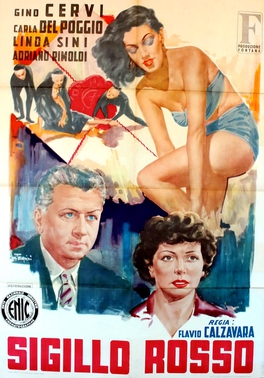
Red Seal is a 1950 Italian crime film directed by Flavio Calzavara and starring Gino Cervi, Carla Del Poggio and Adriano Rimoldi.
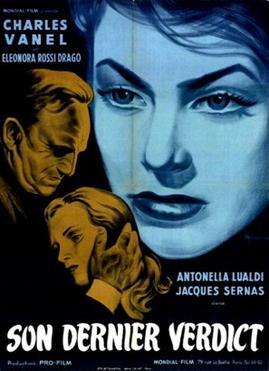
The Last Sentence is a 1951 Italian melodrama-crime film co-written and directed by Mario Bonnard and starring Charles Vanel, Antonella Lualdi and Eleonora Rossi Drago.

Dalila Di Lazzaro is an Italian model, actress and writer.
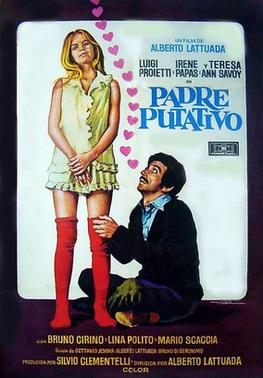
Le farò da padre is a 1974 Italian comedy film co-written and directed by Alberto Lattuada. It is the debut-title of Teresa Ann Savoy. The film was filmed in Apulia.

Venga a prendere il caffè da noi, internationally released as Come Have Coffee with Us, is a 1970 Italian comedy film directed by Alberto Lattuada. It is based on the novel La spartizione by Piero Chiara. The film was awarded with two Nastro d'Argento awards, for best screenplay and for best supporting actress.

Giacomo the Idealist is a 1943 Italian drama film directed by Alberto Lattuada and starring Massimo Serato, Marina Berti and Andrea Checchi. It represents the directorial debut of Lattuada.

La lupa is a 1953 Italian drama film directed by Alberto Lattuada.
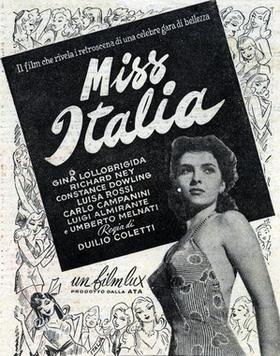
My Beautiful Daughter is a 1950 Italian comedy film directed by Duilio Coletti.

I Always Loved You is a 1953 Italian melodrama film directed by Mario Costa. It is based on a stage play by Enrico Ragusa.

Venetian Honeymoon is a 1959 Italian-French romantic comedy film directed by Alberto Cavalcanti. It is loosely based on the Abel Hermant novel Les noces vénitiennes.
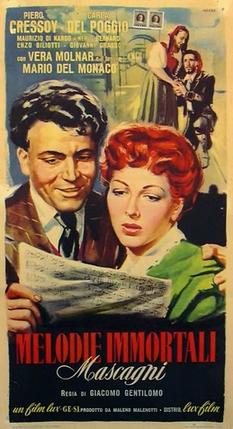
Immortal Melodies is a 1952 Italian musical-biographical melodrama film directed by Giacomo Gentilomo and starring Pierre Cressoy, Carla Del Poggio and Vera Molnar. It is based on real life events of classical composer Pietro Mascagni. The film's sets were designed by the art director Alberto Boccianti.

Storms or Dangerous Girl is a 1953 French-Italian melodrama film directed by Guido Brignone and starring Jean Gabin, Silvana Pampanini and Carla Del Poggio. It was shot at the Farnesina Studios of Titanus in Rome. The film's sets were designed by the art director Ottavio Scotti. Location shooting took place around Perugia where the film is set.
